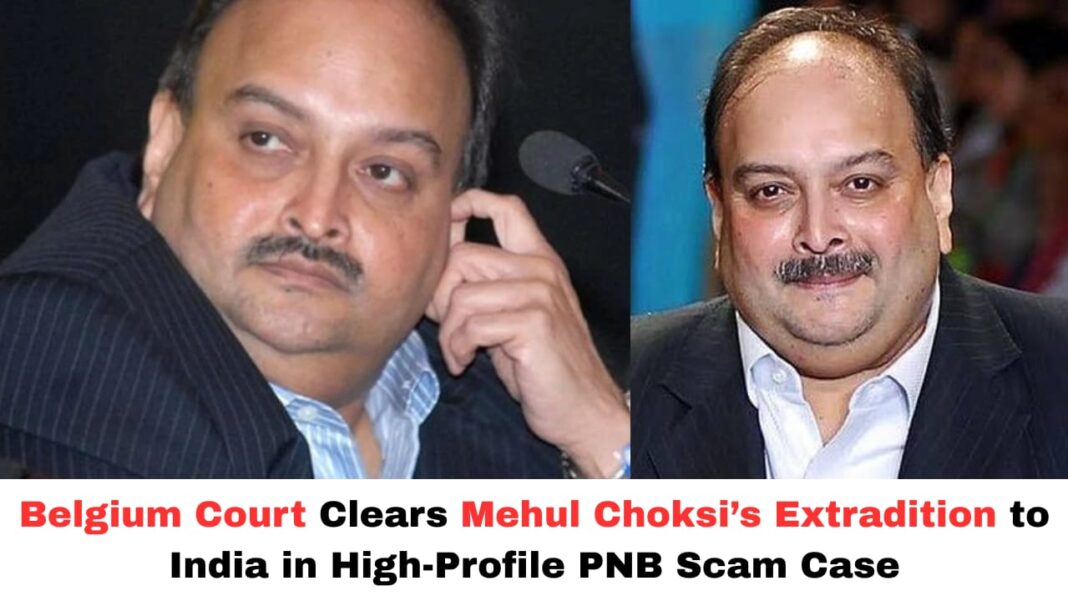Digital News Guru National Desk:
Mehul Choksi Extradition Approved by Belgium Court
In a major boost for Indian law-enforcement efforts, a court in Antwerp, Belgium has ruled in favour of the extradition of Mehul Choksi to India, marking a decisive step in bringing the fugitive diamantaire to face charges linked to one of India’s largest banking fraud cases.
Choksi’s arrest, his legal battle, and now this ruling form a complex tapestry of international co-operation, legal safeguards and a test of India’s ability to bring its economic offenders to justice.
Background: The fraud, the escape and the hunt
Choksi, once a prominent name in India’s jewellery business via the Gitanjali Group, is wanted by Indian agencies for his alleged role in a massive fraud linked to Punjab National Bank (PNB). Reports place the figure at 13,000 crore (or thereabouts) for the PNB scam.

Choksi fled India in early 2018, soon after the fraud came to light. He then acquired citizenship of Antigua & Barbuda through investment (as has been widely reported), and subsequently was located in Belgium, where he appears to have been residing.
In April 2025, Belgian authorities, acting on India’s request, arrested Choksi at Antwerp.
The Belgian court’s decision: What was determined
The Antwerp court found that:
- Choksi’s arrest on India’s extradition request was valid and carried out in accordance with the treaty obligations between India and Belgium.
- The charges India has brought — including criminal conspiracy, cheating, falsification of accounts, corruption under the Prevention of Corruption Act — meet the “dual criminality” test (i.e., comparable offences exist under Belgian law) which is a key threshold for extradition.
- The court rejected Choksi’s appeals challenging extradition (on grounds such as risk of human rights violations or political persecution) — he still retains the right to appeal to Belgium’s Supreme Court within the statutory timeframe (typically 15 days).
In short: the legal pathway for his return to India has been significantly cleared.
India’s assurances: Addressing human-rights and procedural concerns
One of the major hurdles in extradition cases is the concern by the requested country (here Belgium) about how the person will be treated if sent back. India addressed this proactively.
- The Indian Ministry of Home Affairs issued a detailed letter to Belgian authorities, specifying that if extradited, Choksi would be housed in Barrack No. 12 of the Arthur Road Jail, Mumbai, and provided with minimum personal space (three sq m apart from furniture), proper bedding, medical care, clean water, and recreation facilities, in line with standards required by the European Committee for Prevention of Torture (CPT).

- The letter also assured no solitary confinement, no overcrowding, and access to outdoor exercise, board games, reading material etc.
- These assurances were crucial in removing a potential barrier to extradition — that the individual would face treatment in India that was inconsistent with human-rights norms which Belgium (as part of the European legal ecosystem) must take seriously.
Why this decision matters
- Legal precedent – The ruling strengthens India’s hand in future extradition efforts for economic offenders. It demonstrates that India can satisfy justice-systems abroad regarding treatment of detainees and legal standards.
- Message on corporate/financial accountability – With Choksi being a high-profile industrialist, this sends a signal that even top-level fugitives may be brought back.
- Diplomatic / treaty mileage – The India-Belgium extradition case is being cited as the first major test of their 2020 treaty. Effective execution boosts confidence in India’s enforcement capabilities.
- Deterrence – To Indian business and financial circles, this is a reminder of cross-border risk, if one attempts to escape.
What happens next – and what to keep an eye on
- Appeal window: Choksi has up to 15 days to appeal in Belgian Supreme Court. If he appeals, extradition will await resolution.
- Move for handover: Once final, Belgian authorities will work out the logistic/administrative steps to transfer Choksi to India. Timing and conditions will matter.
- Trial in India: On return, Choksi will face trial (or continuation of proceedings) for the PNB fraud and associated charges (cheating, criminal conspiracy, corruption, money-laundering).
- Monitoring detention conditions: Given the assurances, India’s performance in terms of humane treatment will likely be watched (both domestically and internationally).
- Parallel litigations/asset recovery: Choksi’s movement triggers renewed efforts to recover assets, freeze funds, and prosecute co-accused (such as his nephew Nirav Modi).
Challenges and caveats
While this is a significant milestone, it is not the end-game:
- Choksi’s right to appeal means there may still be delays.
- Logistic and diplomatic arrangements (flight, transfer guards, timing) could introduce hurdles.
- Even once in India, trial proceedings may be prolonged (as many major fraud cases are).
- There remain human-rights critics who will watch India’s treatment of him closely — any deviation might raise fresh concerns or legal complications.
- The international cooperation required (asset tracing, extradition logistics, legal mutual assistance) remains complex.
Conclusion
For India, the Belgian court’s approval of Mehul Choksi’s extradition is a major achievement: years in the making, involving coordination between the Central Bureau of Investigation (CBI), Ministry of External Affairs (MEA), the Belgian judiciary and other agencies.
For Choksi, it closes off yet another option for evasion, bringing him closer to facing Indian justice for what is among the largest banking frauds in recent memory.
But the road ahead will test India’s legal system, prison standards, and international standing. The world will be watching — not just whether Choksi returns, but how swiftly and under what conditions, and how effectively India proceeds from here.
You May Also Read: Air Quality Crisis in Delhi After Diwali Fireworks









